Laboratories
Electrophysiology Lab
PI :Prof. RanjanaPatnaik Students :Sumedha Mukherjee (Ph.D.) ; Gaurav Kumar (Ph.D.) ; Alok Tiwari (Ph.D.) ; Chandrakant Singh Tekam (Ph.D.) Objective :The lab focuses on cerebral circulation, neruophysiology, neurological disorders and neuroprotection. Ongoing Research(es) :Neurodegenerative diseases and neuroprotection; Molecular biology of Neurological disorders Outcome (Till Date) :Low cost hearing aid; Android operated caregiver bed; Electromagnetic healing apparatus; Dynamic cerebral pressure modelling; phytochemicals as potent drugs in Stroke (MCAO, TBI) model LAB Facilities :HPLC-ECD; Laser Doppler Blood Flow Monitor; Non-invasive Blood Pressure Monitor; Tissue Oxygenation Monitor; Probe Sonicator; -20 Freezer; Rota Rod.
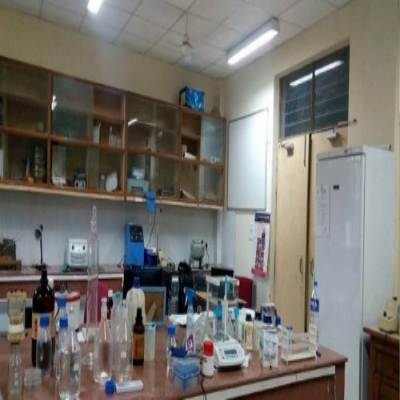
Bio-Medical Signal & Images Processing Lab
The recording and analysis of biosignals and Images have gained much more important in these recent years, which allows the medical practitioners to extract needed information for analyzing the physiological events real-time, leading to the accurate diagnosis and better medical treatment of the patients. This Lab, is used for giving hands on experience to UG, PG and Research students. In this lab we are mainly working on: (i) Digital Signal processing techniques, (ii) Image Processing techniques, and (iii) Application of Artificial Intelligence to Biomedical Engineering areas. At research level we are working to improve the disease diagnosis, and particularly interested to develop the new algorithms to improve the quality of radiological images in terms of artifact corrections, enhancement and automatic segmentation. A strong interest is arising in the field of deep learning based segmentation and medical image quality assessment..
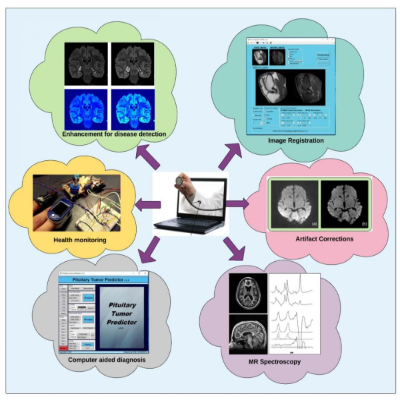
Biomaterial Charaterization Lab

Biomechanics Lab
Biomechanics Laboratory is associated with the research in the field of Orthopaedic Implants, Dental Biomechanics and Energy Harvesting using Piezo electric devices. Present work focuses primarily on Computational Biomechanics of lower extremity as well as dental biomechanics. It deals with 3D modeling using CT and MRI data, implant design (CAD/CAM) and Optimization as well as Simulations (Finite Element Analysis). Lab has its collaboration with Institute of Medical Sciences, BHU and faculty of Dental Sciences, Trauma Centre, BHU. Lab has fully equipped with the licensed versions of software:- Ansys, Anybody, Creo and Mimics Medical+ 3Matic Medical.
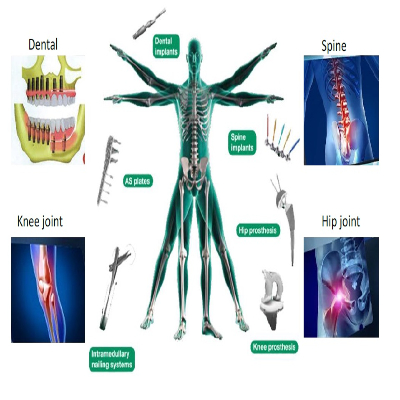
Cellular therapeutics and Bio-devices Lab
Research Interests
- Developing cellularised platforms which enables selective differentiation of human stem cell into tissue specific cells.
- Developing cost effective Biosensors and Bio-MEMS/Bio-Devices.
- Process development towards large scale production of nanomaterials of clinical significance for nano-therapeutics uses.
- Biocompatible metal ion impregnated polymeric nanocomposite films as efficient antibacterial materials
Achievements
- Achieved selective differentiation of human stem cell into osteoblasts and other lineages.
- Developed surface analytical methods for label-free quantification of molecules.
- Established detection methods for cost effective biosensors.
Outreach activities
Lab provide training / dissertation work support to UG/PG students of other institutes in the area of stem cell and biosensors .
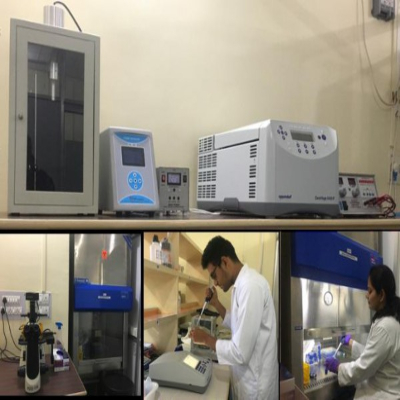
Computational Neuroscience & Neuro-Imaging Lab
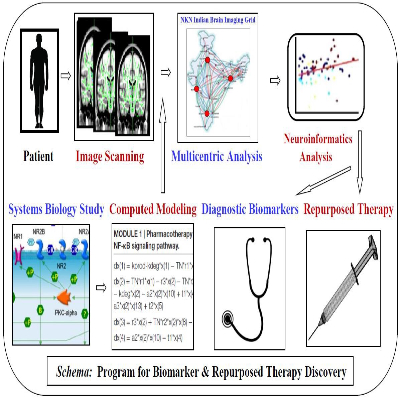
Computer Application and Simulation Lab

Electronic Circuit and Control Lab
Transducer and Instrumentation Trainer (DYNA1750) , 3MHz Function generator(HM5030S4), Analog Digital Trainer Kit(EDC-20),, Analog circuit development(Scientech 2612),Digital circuit development platform (Scientech 2611), Analog digital circuit development platform (Scientech 2613), Advanced Analog circuit development (Scientech ST2612A), Understanding characterstics of MOSFET, FET & UJT(Nvis 6512A), Autoranging Digital Multimeter(SM5011A), OP-Amp Application Trainer(ST2323), BJT amplifier and Emitter Follower(NV6542), Transient analysis of RLC circuit(Nvis 6515), Light and Temperature sensor module(DT-4001), Signal conditioning Ckts(DT-4004), Universal breadboard system (1MHz FG)( AET-205A), Component Development System(PDC-20), 30MHz CRO scientech(SM410), 30MHz 2 channel CRO scientech(801C), 30MHz CRO + 1MHz FG scientech(820), Thermocouple Trainer kit(VPL), Thermistor Sensor steady card(VPL), LVDT Trainer(VPL), Microprocessor Trainer Kit(VPL), DC motor Speed control set(SCL 107 + 106), AC servo motor speed torque characterstics(SCL 112), AC motor position control(CL-ACM), Temperature system stimulator(CLTSS), Linear system stimulator(CLSS &Vijayanta), Potentiometric error detector(CL-PED), PID temperature control(TCS101), PID Control trainer(CPID101), Compensation design trainer(CNS101).
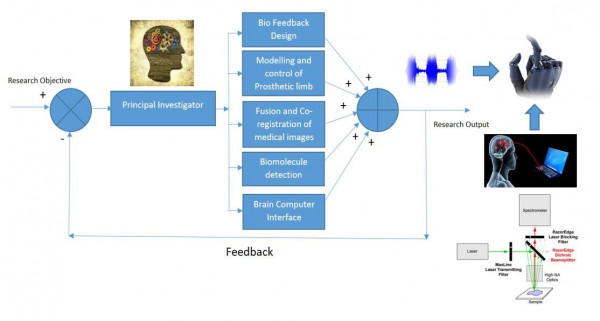
Materials for Health Care and Nanomedicines

Microprocessor Lab
This is an UG Lab. mainly designed to give student hand on experience in the area of assembly level programing of microprocessor/microcontroller, interfacing peripheral devices. This Lab. is also equipped with PIC and ARM processer trainer system. This lab provides support to the UG/PG students introduced in carrying out project work on the design and fabrication of embedded system of biomedical design. Further the facilities available in the lab are also used by student for carrying out exploratory projects

Physiology Lab
Major Facilities:
- Non-invasive Blood Pressure Monitor (ADinstrument); Laser Doppler Blood Flow Meter(ADinstrument); Tissue oxygen Monitor (Oxford Optronix); HPLC-ECD; RotaRod; Ultrasound Probe Sonicator; -200C Refrigerator; Stereotactic Device with surgical table; Polyrite-D for EEG, ECG and EMG; EMF generator.
Minor Facilities:
- Centrifuge; Electronic Weighing Balance; Water Bath; Incubator; Oven; Bone Driller; Tissue Homogeniser; Refrigerator; Digital Sonicator; Double Distallation Unit; Liquid Nitrogen Container; Magnetic Stirrer; Vortex, pH meter; Heating Mantle.
Major Thrust Area:
- Rodent Model Development: Middle Cerebral Artery Occlusion; Bilateral Common Carotid Artery Occlusion; Stress; Wound Healing etc.
- Neuroprotection
- In silico Drug Designing
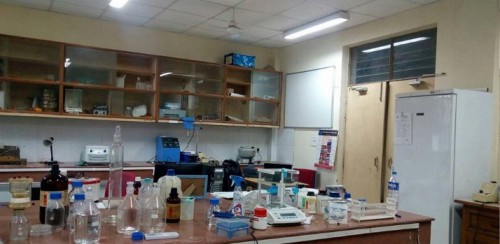
Polymer Chemistry Lab

Polymer Engineering Lab
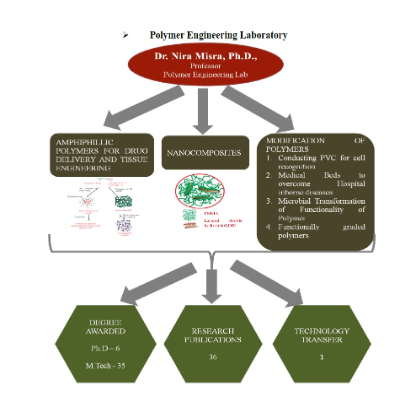
Tissue Engineering & Biomicrofludics Lab
Research interests in Tissue Engineering and Biomicrofluidics (TEBM) Laboratory forge multidisciplinary teams covering expertise ranging from core engineering and biomaterials discovery to the in-depth understanding of human physiological systems. The primary research areas include the recreation of three-dimensional (3D) tissue constructs and functional entities of complex organs, biomaterial scaffolds, 3D bioprinting, Stem cells, biocompatibility assessment and characterization of microengineered tissue reconstructs, and testing of their physiological compatibility upon implantation in the animal models. In addition, we focus on integrating microfluidics technology with tissue engineering and implementing them in fabricating on-chip tissue and organ models. Fabrication of biomedical microelectromechanical systems (Bio-MEMs) and lab-on-a-chip platforms for low-cost point-of-care diagnostics (POCD) and biosensor development is one of our major goals
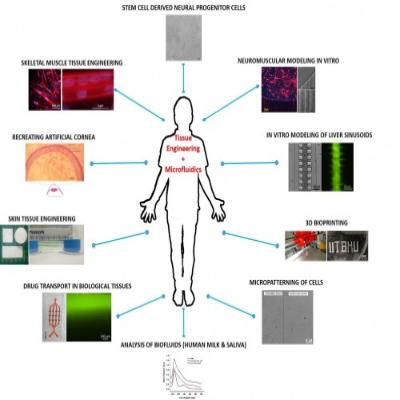
Transducer Instrumentation Lab
